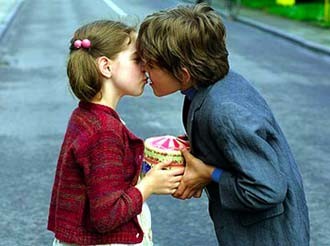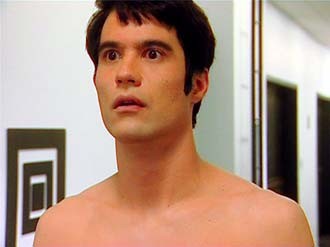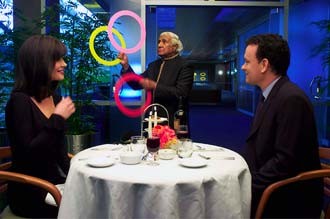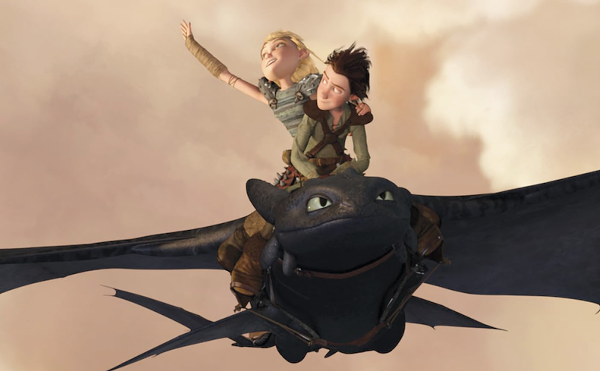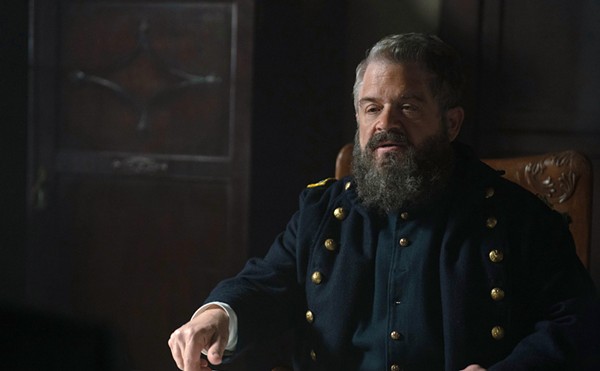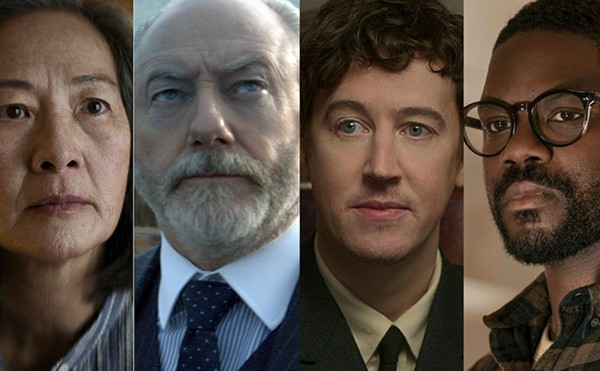|
Love Me If You Dare Dir. Yann Samuell; writ. Jacky Cukier, Yann Samuell; feat. Guillaume Canet, Marion Cotillard, Thibault Verhaeghe, Joséphine Lebas-Joly, Gérard Watkins (R) Julien and Sophie meet when both are 8. Julien defends Sophie when schoolyard bullies scorn her for her Polish origins, and Sophie helps Julien endure the death of his beloved mother. The two develop a fast and lifelong bond based on a private code of one-upmanship. Each is pledged to do whatever the other demands, no matter how dangerous, nasty, or preposterous. Over the years, Julien (played as a child by Verhaeghe, as an adult by Canet) and Sophie (played as a child by Lebas-Joly, as an adult by Cotillard) escalate their challenges from inane pranks into perilous and demented stunts. It is one thing to dare a child to pee on the floor of the principal's office or to insist that a college student take an exam wearing her bra and panties over her outer clothes. It is quite another to challenge a woman to lie on the tracks of an approaching train or to demand that a man bury himself in a block of cement. Though they marry others and dare each other to stay apart for years at a time, the obsessive relationship between Julien and Sophie becomes more vital to them than anything else. It is a secret passion fueled by contention. The original French title of Love Me If You Dare is Jeux d'enfants, Childhood Games, and decades after outgrowing the thrill of goading the other into slapping the brawny gymnastics coach or releasing the school bus parking brake, Julien and Sophie are still responding to each other's childish taunts. What might seem a story of powerful, enduring love is a study in arrested development. The private game of demeaning risks that Julien and Sophie dare not abandon long after leaving other childish things behind is sadism codified. "I never know when you're playing a game," says Sophie, and a weary viewer might make the same complaint to director Yann Samuell. It is never entirely clear whether Samuell is celebrating the spunk of a man and woman who reject the numbing middle-class security embraced by the rest of their generation or diagnosing a case of shared psychosis. Flamboyant camera work and editing fail to inject life into a lethal relationship that passes for love. Love Me If You Dare is a provocative film, but what it provokes is no valuable thought or feeling but rather irritation at the childish game that it both depicts and is. — Steven G. Kellman
Writ. & dir. Greg Pak; feat. Tamlyn Tomita, Sab Shimono, Wai Ching Ho, Greg Pak (NR) If robots are machines in human form, they can teach us something about what we think it is to be homo sapiens. Written and directed by talented novice Greg Pak, Robot Stories is composed of four separate, exemplary tales about the nebulous boundary between man and machine. An independent production devoid of expensive, and unnecessary, special effects, it offers crisp glimpses into a near future in which the intelligence is artificial but the emotion is real. In the opening segment, called "My Robot Baby," couples are permitted to rear children only after they have proven their parental skills on android infants. Shortly after a pair of successful young professionals takes home one of these training babies, the husband leaves on a business trip. Marcia (Tomita) resents the traditional female burden of principal nurturer, especially when the mechanical baby, who bonded with her husband, proves hostile and unruly with her. Though she tries to treat her ward as just another electronic device, Marcia cannot help responding to it with exasperation, anger, fear, and love. In "The Robot Fixer," the least technological of the four vignettes, a young man lies comatose in a hospital bed while his mother (Ho) regrets not only his vegetative state but also the estrangement that kept them apart. Though her son is brain-dead, she revives their relationship by repairing the toy robots he played with as a child. "Machine Love" offers variation on the vision pioneered in Karel Capek's 1920 play R.U.R., which coined the term robot, of androids as exploited proletarians. Pak stars as Archie, a handsome robot designed to perform office tasks efficiently. Though he possesses circuits instead of arteries, Archie feels hurt when fellow workers refuse to treat him as anything but a piece of labor-saving equipment. He eventually comes to the rescue of a female robot abused by callous employees in a nearby building. If, as an erring poet might have said, to care is human, Archie is more human than anyone else in the film. Finally, "Clay" is set in 2007, when bodies still die but it is possible to perpetuate one's consciousness beyond the grave by preserving a digital copy of brain waves. An ailing old sculptor named John Lee (Shimono) resists this species of immortality. He would rather live and die as an imperfect vessel of flesh and blood than survive virtually, and falsely. Few false moves mar the writing or the acting in Robot Stories. Avoiding the clamorous grandiosity of most cinematic science fiction, Pak proves that understanding the human heart is not rocket science. — Steven G. Kellman
Dir. Steven Spielberg; writ. Sacha Gervasi, Jeff Nathanson; feat. Tom Hanks, Catherine Zeta-Jones, Stanley Tucci, Chi McBride, Diego Luna, Kumar Pallana, Zoe Saldana, Eddie Jones (PG) Here's the basic set-up for The Terminal, which probably sounded like a hoot when it was kicked around Hollywood: Tom Hanks plays this guy from the former Soviet Union who has just landed at a New York airport. Trouble is, while he was in the air a civil war broke out in his home country; when he lands, his country doesn't exist. Bureaucrats at the airport can't recognize his papers, because they come from a defunct nation, and can't think of any way to handle his case, so they tell him he has to stay in the terminal until they can work something out. He lives in the airport for nine months. There are a lot of ways this could go. The Terminal could be a Kafka-esque nightmare, or a redemptive adventure story, but no matter how you play out the plot, it's essential that you play it like a fable, that you acknowledge the premise is ridiculous and its details are not to be taken literally. (There is a factual story like The Terminal, actually, of an Iranian refugee stranded in Paris' Charles de Gaulle airport since 1988. But that true story is too ridiculous to believe, much like the one in which an underachieving fratboy who runs his business into the ground becomes Leader of the Free World.) Bafflingly, Steven Spielberg presents the story at face value. He steers Hanks toward some fairly broad comedy, but for the most part, the actors speak like real human beings. The trouble is, they're acting in a universe that doesn't operate by any of our rules. An example: When Hanks arrives, a bureaucrat played by Stanley Tucci tries to explain his situation. There's a serious language barrier, and Tucci sends for a translator. The translator never arrives, and the film never refers to him again; instead, Hanks is forced to teach himself English using a guidebook to New York. John Williams' score, which should be whimsical but is instead as drab as airline food, doesn't help. For a story in which vintage jazz winds up playing a prominent role, the white-bread pap on the soundtrack is inexcusable. Cinematographer Janusz Kaminski has finally gone overboard with the hazy, too-bright white light sources and pale, washed-out colors. Many of these flaws might have been forgiven if the movie didn't louse things up so badly toward the end. Tucci's character makes it his mission in life to screw Hanks, although he has no motive and doing so is more difficult than the alternative. And I haven't even mentioned the scene in which the airport's whole staff drops everything and follows Hanks down to the gate when it looks like he might finally get to leave. Spielberg should certainly be encouraged in his efforts to make more lighthearted fare, but The Terminal is a serious misfire, an indication that he might need a change in terms of longtime collaborators as well as themes. He may be stuck in Straightsville, but he doesn't need a passport to get out. — John DeFore
|

